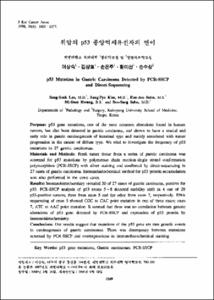위암의 p53 종양억제유전자의 변이
- Keimyung Author(s)
- Lee, Sang Sook; Kim, Sang Pyo; Sohn, Soo Sang
- Journal Title
- 대한암학회지
- Issued Date
- 1998
- Volume
- 30
- Issue
- 6
- Abstract
- Purpose: p53 gene mutations, one of the most common alterations found in human tumors, has also been detected in gastric carcinoma, and shown to have a crucial and early role in gastric carcinogenesis of intestinal type and mainly associated with tumor progression in the cancer of diffuse type. We tried to investigate the frequency of p53 mutations in 27 gastric carcinomas.
Materials and Methods: Fresh tumor tissue from a series of gastric carcinoma was screened for p53 mutations by polymerase chain reaction-single strand conformation polymorphism (PCR-SSCP) with silver staining and confirmed by direct-sequencing in 27 cases of gastric carcinoma. Immunohistochemical method for p53 protein accumulation was also performed in the same cases.
Results: Immunohistochemistry revealed 20 of 27 cases of gastric carcinoma, positive for p53. PCR-SSCP analysis of p53 exons 5〜8 detected mobility shift in 4 out of 20 p53-positive tumors; three from exon 5 and the other from exon 7, respectively. DNA sequencing of exon 5 showed CGC to CAC point mutation in one of three cases; exon 7, ATC to AAC point mutation. It seemed that there was no correlation between genetic alterations of p53 gene detected by PCR-SSCP and expression of p53 protein by immunohistochemistry.
Conclusions: Our results suggest that mutations of the p53 gene are rare genetic events in carcinogenesis of gastric carcinomas. There was discrepancy between mutations screened by PCR-SSCP and overexpressions in immunohistochemical staining.
- Alternative Title
- p53 Mutation in Gastric Carcinoma Detected by PCR-SSCP and Direct-Sequencing
- Publisher
- School of Medicine
- Citation
- 이상숙 et al. (1998). 위암의 p53 종양억제유전자의 변이. 대한암학회지, 30(6), 1069–1077.
- Type
- Article
- ISSN
- 0496-6872
- Appears in Collections:
- 1. School of Medicine (의과대학) > Dept. of Pathology (병리학)
1. School of Medicine (의과대학) > Dept. of Surgery (외과학)
- 파일 목록
-
-
Download
 oak-bbb-02766.pdf
기타 데이터 / 559.62 kB / Adobe PDF
oak-bbb-02766.pdf
기타 데이터 / 559.62 kB / Adobe PDF
-
Items in Repository are protected by copyright, with all rights reserved, unless otherwise indicated.